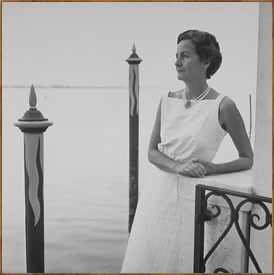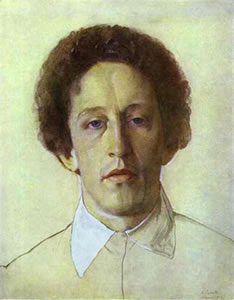De Engelse schrijfster Nancy Mitford werd geboren op 28 november 1904 in Londen. Zie ook mijn blog van 28 november 2008.
Uit: The Pursuit of Love
“The result was guerrilla warfare at its most exciting. Housemaids are notoriously early risers, and can usually count upon three clear hours when a house belongs to them alone. But not at Alconleigh. Uncle Matthew was always, winter and summer alike, out of his bed by five a.m., and it was then his habit to wander about, looking like Great Agrippa in his dressing-gown, and drinking endless cups of tea out of a thermos flask, until about seven, when he would have his bath. Breakfast for my uncle, my aunt, family and guests alike, was sharp at eight, and unpunctuality was not tolerated. Uncle Matthew was no respecter of other people’s early morning sleep, and, after five o’clock one could not count on any, for he raged round the house, clanking cups of tea, shouting at his dogs, roaring at the housemaids, cracking the stock whips which he had brought back from Canada on the lawn with a noise greater than gun-fire, and all to the accompaniment of Galli Curci on his gramophone, an abnormally loud one with an enormous horn, through which would be shrieked “Una voce poco fa”—”The Mad Song” from Lucia—”Lo, here the gen-tel lar-ha-hark”—and so on, played at top speed, thus rendering them even higher and more screeching than they ought to be.
Nothing reminds me of my childhood days at Alconleigh so much as those songs. Uncle Matthew played them incessantly for years, until the spell was broken when he went all the way to Liverpool to hear Galli Curci in person. The disillusionment caused by her appearance was so great that the records remained ever after silent, and were replaced by the deepest bass voices that money could buy.
“Fearful the death of the diver must be,
Walking alone in the de-he-he-he-he-depths of the sea”
or “Drake is going West, lads.”
These were, on the whole, welcomed by the family, as rather less piercing at early dawn.
“Why should she want to be married?”
“It’s not as though she could be in love. She’s forty.”
Like all the very young we took it for granted that making love is child’s play.
“How old do you suppose he is?”
“Fifty or sixty I guess. Perhaps she thinks it would be nice to be a widow. Weeds, you know.”
“Perhaps she thinks Fanny ought to have a man’s influence.”
“Man’s influence!” said Louisa. “I foresee trouble. Supposing he falls in love with Fanny, that’ll be a pretty kettle of fish, like Somerset and Princess Elizabeth—he’ll be playing rough games and pinching you in bed, see if he doesn’t.”
“Surely not, at his age.”
“Old men love little girls.”
“And little boys,” said Bob.
“It looks as if Aunt Sadie isn’t going to say anything about it before they come,” I said.
“There’s nearly a week to go—she may be deciding. She’ll talk it over with Fa. Might be worth listening next time she has a bath. You can, Bob.”

Nancy Mitford (28 november 1904 – 30 juni 1973)
De Oostenrijkse schrijver Stefan Zweig werd op 28 november 1881 in Wenen. Zie ook mijn blog van 28 november 2006 en ook mijn blog van 28 november 2008.
Uit: Clarissa
„Wenn Clarissa in späteren Jahren sich bemühte, ihr Leben zu besinnen, wurde es ihr mühsam, den Zusammenhang zu finden. Breite Flächen schienen wie von Sand überweht und völlig undeutlich in ihren Formen, die Zeit selbst darüberhinschwebend, unbestimmt wie Wolken und ohne richtiges Maß. Von ganzen Jahren wußte sie sich kaum Rechenschaft zu geben, indes einzelne Wochen, ja sogar Tage und Stunden gleichsam wie gestern geschehen noch Gefühl und inneren Blick beschäftigten, manchmal war ihr, mutete es sie an, als hätte sie nur einen geringen Teil mit wachem und beteiligtem Gefühl hingebracht und den andern verdämmert in Müdigkeit oder leerer Pflicht.
Am wenigsten wußte sie im Gegensatz zu den meisten Menschen von ihrer Kindheit. Durch besondere Umstände hatte sie nie ein richtiges Heim und familiäre Umwelt gekannt. Ihre Geburt hatte in dem kleinen galizischen Garnisonstädtchen, dem ihr Vater, damals nur Hauptmann des Generalstabs, zugeteilt war, zufolge einer unglücklichen Verkettung von Umständen der Mutter das Leben gekostet; der Regimentsarzt hatte an der Grippe niedergelegen, durch Schneeverwehung kam der von der Nachbarstadt telegrafisch berufene zu spät, um die dazugetretene Lungenentzündung noch erfolgreich bekämpfen zu können. Mit ihrem um zwei Jahre älteren Bruder wurde Clarissa gleich nach der Taufe in der Garnison zur Großmutter gebracht, einer selbst schon hinfälligen Frau, die mehr Pflege forderte, als sie geben konnte;…“

Stefan Zweig (28 november 1881 – 22 februari 1942)
De Amerikaanse schrijfster Dawn Powell werd geboren op 28 november 1896 in Mount Gilead, Ohio. Zie ook mijn blog van 28 november 2008.
Uit: Dance Night
“Lamptown hummed from dawn to dusk with the mysterious humming of the Works, the monotonous switching of engines and coupling of cars at the Yard. The freight cars rumbled back and forth across the heart of town. They slid out past the factory windows and brakemen swinging lanterns on top the cars would shout to whatever girls they saw working at the windows. Later, in the factory washroom one girl might whisper to another, “Kelly’s in the Yard to-day. Said be sure and be at Fischer’s Thursday night.”
“Who was firing?” the other would ask, mindful of a beau of her own.
“Fritz was in the cab but I couldn’t see who was firing. Looked like that Swede of Ella’s used to be on Number 10.”
The humming of this town was jagged from time to time by the shriek of an engine whistle or the bellow of a factory siren or the clang-clang of a red street car on its way from one village to the next. The car jangled through the town flapping doors open and shut, admitting and discharging old ladies on their way to a D.A.R. picnic in Norwalk, section workers or linesmen in overalls, giggling girls on their way to the Street Carnival in Chicago Junction. As if hunting for something very important the car rattled past the long row of Lamptown’s factory boarding houses, past the Lots, then on into long stretches of low, level hay-fields where farm girls pitched hay, stopping to wave their huge straw hats at the gay world passing by in a street car.
There was grey train smoke over the town most days, it smelled of travel, of transcontinental trains about to flash by, of important things about to happen. The train smell sounded the ‘A’ for Lamptown and then a treble chord of frying hamburger and onions and boiling coffee was struck by Hermann Bauer’s kitchen, with a sostenuto of stale beer from Delaney’s back door. These were all busy smells and seemed a 6 to 6 smell, a working town’s smell, to be exchanged at the last factory whistle for the festival night odors of popcorn, Spearmint chewing gum, barbershop pomades, and the faint smell of far-off damp cloverfields. Mornings the cloverfields retreated when the first Columbus local roared through the town. Bauer’s coffee pot boiled over again, and the factory’s night watchmen filed into Delaney’s for their morning beer.“

Dawn Powell (28 november 1896 – 14 november 1965)
De Zuidafrikaanse dichter en (oud-)verzetsstijder Dennis Brutus werd geboren op 28 november 1924 in Harare in Zimbabwe. Zie ook mijn blog van 28 november 2008.
No Banyan, Only
The quiet wisdom of the body’s peace:
Carnality, in this our carnal world, is all
Bamboo and iron having sealed
Our mundane eyes to views of time and peace.
Now I am strong as stones or trees are strong,
Insensible, or ignorant with vibrant life;
Streams or the air may wash or pass me by
My mind breathes quiet, lying yours along.
(Upon what meat is this man fed
That he is grown so great?
Diet of eloquent delectable accolades
Warm, soft, kindly, sweet and red.)
Under no banyan tree I strip no onion skin
To find a néant kernel at the still center:
“A little winter love in a dark corner?”
No, Love (for Chrissake, no) no love, no sin.
Sublunary no more, yet more acutely mundane
now
Man’s fingers claw the cosmos in gestures of
despair,
Our souls, since Hersey, seek the helix of
unknowing
Save mine, you-saved, now leafing like a bough.
Breaking through theory-thickets I thrust
To this one corpus, one more self
That gives Content and content to an earth
Littered and sterile with ideas and rust.
Let alphabetic electrons bloat on Freudian
excrement,
Our golden bodies, dross-indifferent, count no
gain,
Finding Gaugin’s eternal island afternoon
And you hibiscus and my continent.
Most kindly you and what indeed can be
More most-required than kindliness
In this our shared world? And thus
My thanks for heartsease balm you render me.
Animals, perhaps, without merit of their own
—Forgive me Poverello, Paduan, my conceit—
Attain at last such steady ecstasy
As this you give, a gift to make us both your
own.

Dennis Brutus (Harare, 28 november 1924)
De Russische schrijver en dichter Alexander Blok werd geboren op 28 november 1880 in St. Petersburg. Zie ook mijn blog van 28 november 2006 en ook mijn blog van 28 november 2008.
The Death of Grandfather
We waited commonly for sleep or even death.
The instances were wearisome as ages.
But suddenly the wind’s refreshing breath
Touched through the window the Holy Bible’s pages:
An old man goes there – who’s now all white-haired –
With rapid steps and merry eyes, alone,
He smiles to us, and often calls with hand,
And leaves us with a gait, that is well-known.
And suddenly we all, who watched the old man’s track,
Well recognized just him who now lay before us,
And turning in a sudden rapture back,
Beheld a corpse with eyes forever closed …
And it was good for us the soul’s way to trace,
And, in the leaving one, to find the glee it’s forming.
The time had come. Recall and love in grace,
And celebrate another house-warming!
Don’t fear death
Don’t fear death in earthly travels.
Don’t fear enemies or friends.
Just listen to the words of prayers,
To pass the facets of the dreads.
Your death will come to you, and never
You shall be, else, a slave of life,
Just waiting for a dawn’s favor,
From nights of poverty and strife.
She’ll build with you a common law,
One will of the Eternal Reign.
And you are not condemned to slow
And everlasting deadly pain.

Alexander Blok (28 november 1880 – 7 augustus 1921)
Portret door Konstantin Somov
De Engelse schrijver, dichter en schilder William Blake werd geboren op 28 november 1757 in Londen. Zie ook mijn blog van 28 november 2006 en ook mijn blog van 28 november 2008.
JERUSALEM (from ‘Milton’)
AND did those feet in ancient time
Walk upon England’s mountains green?
And was the holy Lamb of God
On England’s pleasant pastures seen?
And did the Countenance Divine
Shine forth upon our clouded hills?
And was Jerusalem builded here
Among these dark Satanic Mills?
Bring me my bow of burning gold!
Bring me my arrows of desire!
Bring me my spear! O clouds, unfold!
Bring me my chariot of fire!
I will not cease from mental fight,
Nor shall my sword sleep in my hand,
Till we have built Jerusalem
In England’s
green and pleasant land.

William Blake (28 november 1757 – 12 augustus 1827)
Portret door Thomas Phillips
Zie voor onderstaande schrijvers ook mijn blog van 28 november 2008.
De Canadese schrijver Yves Thériault werd geboren op 28 november 1915 in Quebec.
De Zweedese dichter, schrijver, criticus en reiziger Carl Jonas Love Almqvist werd geboren in Stockholm op 28 november 1793.
